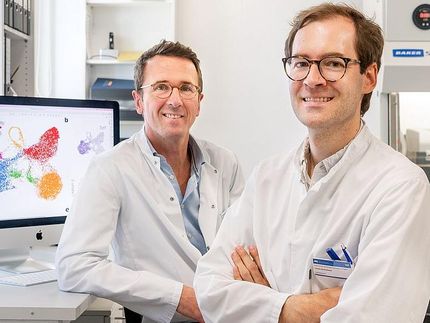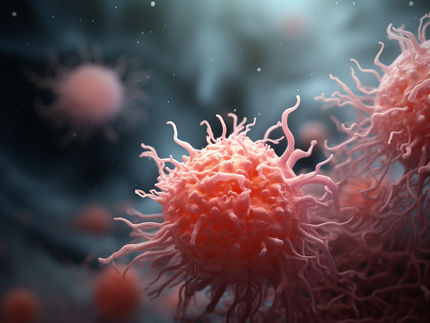Successfully Treating Genetically Determined Autoimmune Enteritis
Advertisement
Using targeted immunotherapy, doctors have succeeded in curing a type of autoimmune enteritis caused by a recently discovered genetic mutation. This report comes from researchers at the Department of Biomedicine of the University of Basel and University Hospital Basel. Their results raise new possibilities for the management of diarrhea, which is often a side effect of melanoma treatment.
Immunodeficiencies can arise due to gene mutations in immune system proteins. As such mutations rarely occur, these immunodeficiencies often go unrecognized or are detected too late for effective treatment. Currently, there are more than 300 different known genetically determined immunodeficiencies, with new examples being described almost every week.
Prof. Mike Recher’s research group at the Department of Biomedicine of the University of Basel and University Hospital Basel recently discovered a genetic immunodeficiency associated with serious, chronic autoimmune enteritis in an adult patient. Happily, according to the researchers’ report in the Journal of Allergy and Clinical Immunology, they were able not only to describe the new mutation, but also to successfully treat the patient with targeted therapy.
Autoimmune reaction caused by mutation
The patient had a rare mutation in the CTLA-4 protein found on the surface of T-cells. Normally, this protein prevents immune cells from attacking an patient’s own body. However, as it was not functioning adequately due to the mutation, T-cells attacked the patient’s own intestinal cells, causing chronic inflammation. This resulted in the patient suffering from severe diarrhea and weight loss.
These unusual symptoms led the cantonal hospital of Graubünden to refer the patient to the special clinic for immunodeficiency at the University Hospital Basel. Initial immunological investigations suggested a genetically determined dysregulation of the immune system. The new CTLA-4 gene mutation was discovered following subsequent analysis of the entire genome at the University Hospital Zurich. Further investigations showed that the mutation causes reduced CTLA-4 function, which led to increased infiltration of the intestinal mucosa by T-cells and therefore to chronic diarrhea.
Treatment with therapeutic antibodies
Working in close cooperation with University Hospital Basel's gastroenterology department, the doctors opted for a therapy that uses a new drug from the monoclonal antibody group to prevent the T-cells from penetrating the intestinal mucosa. This drug (vedolizumab) blocks a specific adhesion molecule on the surface of the T-cell and thereby inhibits immune cells from binding themselves to receptors present in the intestine, preventing the T-cells from penetrating the blood vessels in the intestinal tissue. This treatment produced the desired outcome: after three months, the patient’s chronic diarrhea had stopped completely.
Preventing diarrhea in melanoma patients
In some diseases, however, CTLA-4 inhibition can be used therapeutically, as in the treatment of skin cancer (melanoma). The drug Ipilimumab works similarly to the CTLA-4 mutation, meaning that immune system T-cells are no longer properly inhibited and can more efficiently attack the malignant skin cancer cells. One of the side-effects of this therapy is autoimmune intestinal inflammation – analogous to the inflammation that occurs in patients with the CTLA-4 gene mutation. It is possible that melanoma patients, who suffer severe diarrhea due to the inhibition of their CTLA-4 function, will benefit from this new insight, which opens up new therapeutic possibilities for Vedolizumab.
Cooperation between regional hospitals, basic research and university medical departments
This case demonstrates the importance of precise diagnosis of the molecular causes of an illness in enabling targeted, personalized treatment. “In order to expand our knowledge in these areas, doctors in clinics and regional hospitals must be on the alert for unusual disease phenotypes and refer such patients to specialized university hospital clinics for further evaluation,” says study author Mike Recher. “We also need clinical university centers that are closely linked to research laboratories.”
Original publication
Other news from the department science
Most read news
More news from our other portals
See the theme worlds for related content
Topic world Antibodies
Antibodies are specialized molecules of our immune system that can specifically recognize and neutralize pathogens or foreign substances. Antibody research in biotech and pharma has recognized this natural defense potential and is working intensively to make it therapeutically useful. From monoclonal antibodies used against cancer or autoimmune diseases to antibody-drug conjugates that specifically transport drugs to disease cells - the possibilities are enormous

Topic world Antibodies
Antibodies are specialized molecules of our immune system that can specifically recognize and neutralize pathogens or foreign substances. Antibody research in biotech and pharma has recognized this natural defense potential and is working intensively to make it therapeutically useful. From monoclonal antibodies used against cancer or autoimmune diseases to antibody-drug conjugates that specifically transport drugs to disease cells - the possibilities are enormous




























































